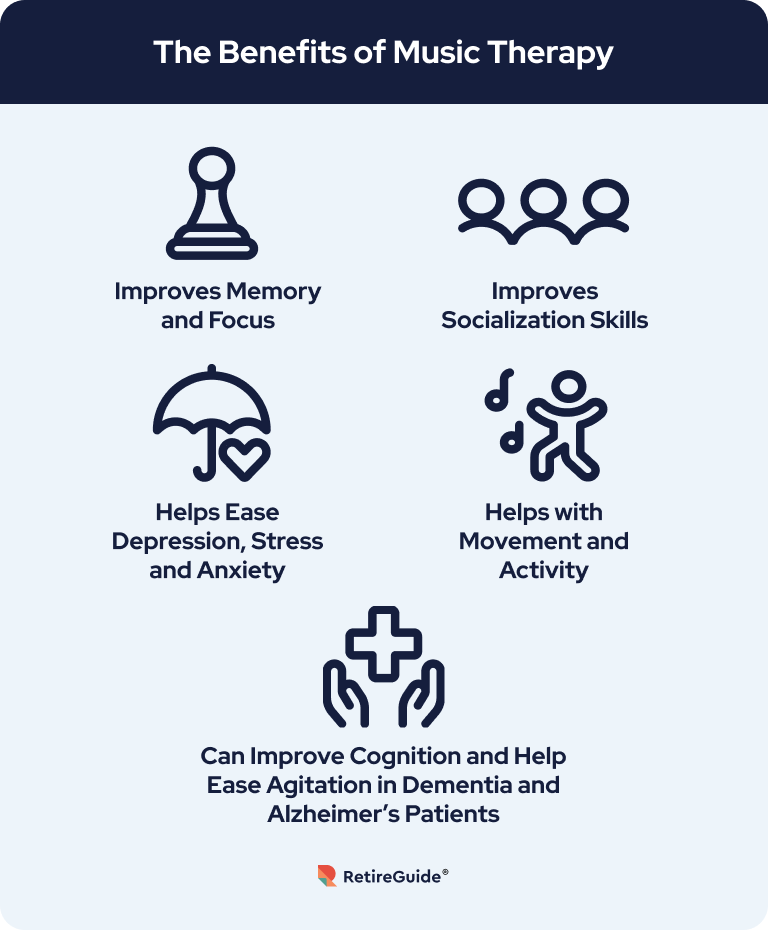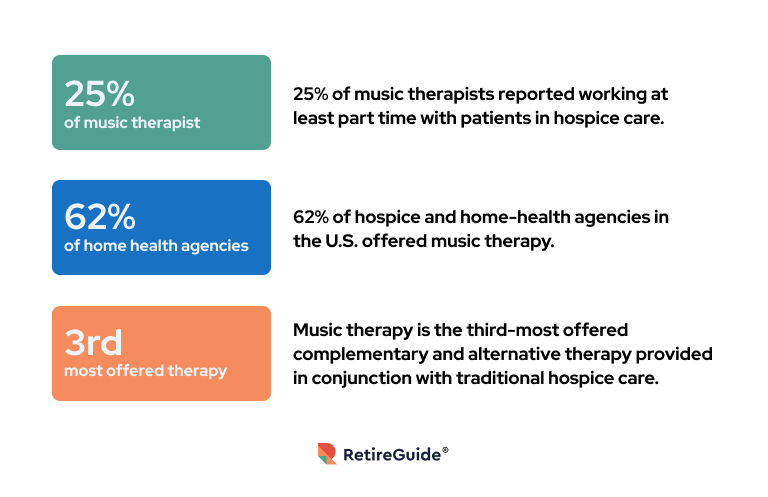Music Therapy for Seniors
Music therapy is one potential avenue to help seniors who are dealing with a variety of issues. It is a broad term that can apply to several techniques, ranging from music interventions to help those with dementia to playing instruments and interacting with music to improve social skills.

- Written by Christian Simmons
Christian Simmons
Financial Writer
Christian Simmons is a writer for RetireGuide and a member of the Association for Financial Counseling & Planning Education (AFCPE®). He covers Medicare and important retirement topics. Christian is a former winner of a Florida Society of News Editors journalism contest and has written professionally since 2016.
Read More- Edited By
Lamia Chowdhury
Lamia Chowdhury
Financial Editor
Lamia Chowdhury is a financial content editor for RetireGuide and has over three years of marketing experience in the finance industry. She has written copy for both digital and print pieces ranging from blogs, radio scripts and search ads to billboards, brochures, mailers and more.
Read More- Reviewed By Bart Astor
- Published: February 9, 2023
- Updated: May 23, 2023
- 11 min read time
- This page features 11 Cited Research Articles
- Edited By
- Music therapy is a broad term that applies to many different styles of treatment — from listening to songs to evoke memories and emotions to using rhythms and beats to soothe those with severe dementia.
- The potential benefits of music therapy can include improved cognition, increased social skills and better movement and mobility. It can be crafted to suit each individual’s needs.
- Music is a powerful tool and deeply connected to memory, making music therapy a potentially beneficial treatment for seniors who have Alzheimer’s or dementia.
What Is Music Therapy?
Music therapy is a lesser known but potentially very effective avenue to achieving many of the common therapy goals by leveraging peoples’ everyday experiences and exposure to music to improve their lifestyle.
“Music is so interwoven with all aspects of life. From the moment we’re born, our caregivers sing to us, they rock us and it’s comforting,” Alaine Reschke-Hernandez, a board-certified music therapist and assistant professor at the University of Kentucky, told RetireGuide.
“We play songs with our kids to engage them and help them learn language and socialize. We have music at our important moments, such as getting married or graduation.”
Music therapy can tap into the power that music holds over many people to achieve numerous goals. It can be used to improve cognition and can be particularly helpful to those who have dementia or Alzheimer’s.
It is also an avenue to improve socialization skills and movement skills. It can be used to recall memories and to relieve stress and anxiety.
Part of music therapy’s versatility is because there is no one specific treatment or style. It can range from playing familiar music to trigger happy memories in dementia patients to using specific tones and frequencies to soothe a patient’s depression or anxiety.
- Strengthen memory and focus
- Calm agitation in Alzheimer’s and dementia patients
- Help ease depression and stress
- Increase movement and exercise
- Enhance communication skills
- Encourage socialization
According to the Berklee College of Music, music therapists will assess the needs and condition of a patient before deciding what style of music intervention makes the most sense for them. Like other types of therapy, there is no one-size-fits-all solution.
Music therapists work to develop a treatment plan that can be beneficial to each specific patient.
How Music Therapy Helps Seniors
For several reasons, music therapy can be a particularly beneficial treatment for seniors and help promote healthy aging. According to an article from Columbia University, 10% of older Americans have dementia. The U.S. Centers for Disease Control and Prevention have found that as many as 20% of people who are 55 or older have some form of mental health concern as well.
Some of the key areas that music therapy can help to improve are mental health issues and dementia.

Given that these issues are particularly prevalent among seniors, music therapy may make the most sense for that group.
Music therapy can also provide benefits for several other issues that often plague seniors. For example, it is a tool to improve socialization. Some music therapies involve playing music together or even altering and coming up with new versions of songs.
And the benefits don’t end with music therapy’s mental health effects. In some situations, music therapy is paired with other kinds of treatments to address physical health issues affecting a patient. Take, for example, that harmonicas have been used to help improve the lung capacity and muscle tone of patients with COPD and other chronic lung diseases. Besides these breathing and lung benefits, music therapy can help improve a patient’s mobility, dexterity, strength, balance, pain management and more.
“With older adults, a lot of times music therapists are working on physical goals such as maintaining motivation for whether they’re going through physical therapy or dealing with chronic pain issues, or they need to work more on the stress management or motivation side,” Joy Allen, the Chair of Music Therapy at the Berklee College of Music, told RetireGuide.
*Ad: Clicking will take you to our partner Annuity.org.
How Music Therapy Helps Alzheimer’s and Dementia Patients
Dementia can be an incredibly difficult ailment to overcome. Declines in cognition and memory can be both distressing for the patient and result in significant declines in quality of life and mental wellness.
“As they experience declines in their memory and thinking, it undermines their ability to initiate social engagement and talking to other people,” Reschke-Hernandez said.
“It also becomes really challenging for them to engage in things that they may have enjoyed, such as reading a book or following a plot in a story, playing checkers or doing those kinds of things because memory is involved in everything that we do.”
But according to the National Library of Medicine, studies have shown that music therapy can help improve the cognition of those with dementia. Another study found that music can evoke autobiographical memories in Alzheimer’s patients.

Virtually everyone at some point in their lives has tied music to memories. Hearing a song can have a significant cognitive impact and help send you back to the emotions and feelings you associate with that song.
This makes music therapy a potentially critical way for dementia patients to recall memories and emotions.
Music therapy can also be adapted to help patients who are at different stages of dementia. What counts as music therapy can vary heavily depending on the specific needs of the patient.
“In the early stages of dementia, it might look like providing some cognitively challenging activities,” Reschke-Hernandez said.
“For instance, copying rhythms on a drum, completing words to a song that they know really well, reminiscing and answering questions about songs that prompt different memories, for example, of a dance that they went to or their wedding or time with their family.”
It’s the job of a music therapist to evaluate the patient and ensure that the style of therapy used makes sense for them and their specific situation.

“It’s not a one-size-fits-all. It might be really hard for someone with severe dementia to actually sing along to a recording,” Reschke-Hernandez said. “But a music therapist might be able to adapt it and add more repetition and slow things down so that they can maybe hum along or at least tap their toes.”
It is also important for music therapists to ensure that the treatment is in no way harmful or detrimental to the patient. The downside of music’s powerful ties to memories is that not all those memories may be good.
Misunderstanding the importance of a certain song or rhythm to a patient could result in triggering the wrong thoughts or emotions.
“If we are picking music and not paying attention to how someone feels, they could feel incredibly rotten after listening to a song that prompts a terrible time from their life.” Reschke-Hernandez said. “If they can’t remember why they feel bad, they might just continue to feel bad.”
How Music Therapy Helps Palliative Care Patients
For similar reasons that it is effective for those with dementia or cognitive issues, music therapy can be beneficial to those who are entering palliative care or hospice care as well.
Both hospice and palliative care are focused on the comfort of the patient above all else, with hospice representing end-of-life care and palliative care still including attempts or hopes to cure the patient.
- Alleviate fears and anxieties
- Decrease feelings of isolation
- Promote feelings of vitality and wellbeing
- Decrease the perception of pain
Music can be a powerful stress-relieving tool. Music from a patient’s happy and important times in life or even music that is new to them can serve as a great comfort if they are suffering or nearing the end of their life.
While music obviously cannot legitimately cure health issues, it can be remarkably soothing and even potentially decrease the patient’s perception of pain.

Similar to dementia patients, music therapists can help ensure that the style of therapy selected doesn’t harm or discomfort the hospice patient in any way. There may be a song, for example, that family members know the patient listened to often in their life.
But if that song is associated with sad or uncomfortable memories, then it is probably not the right choice to include in a comfort care setting like hospice.
Does Insurance or Medicare Cover Music Therapy?
Medicare can cover music therapy in some circumstances, but that coverage is not always robust, and the parameters can be narrow.
The U.S. Centers for Medicare and Medicare Services states that it will cover “melodic intonation therapy,” but only for patients who are non-fluent and aphasic, meaning they can no longer speak.
The patient must also have already proven to be unresponsive to conventional therapy.
Music therapy, however, could also potentially be covered under Medicare if it is designated as a mental health treatment. If your music therapy is classified as an outpatient mental health treatment, then it may be able to be covered.
According to the American Music Therapy Association, the average hourly music therapy session costs $67.
As far as private insurance, the American Music Therapy Association has also found that it typically is decided on a case-by-case basis.
Whether music therapy is covered or not will likely depend on your specific circumstances and insurance.
Music Therapy Activities for Seniors
Music therapy is a broad term that applies to numerous types of treatments, and that means that there are many different activities available to seniors.
- Listening to music
- Writing and singing songs
- Improvising or altering existing songs
- Playing a musical instrument
- Using musical devices or technology
For those who are dealing with advanced cognitive issues, simply experiencing simple rhythms or vibrations from something like a drum can be beneficial.
But for many seniors, music therapy can be much more involved. Music therapists can work with seniors to help them create their own music or alter existing songs.
They can help them learn how to use an instrument, which can also help some seniors to form a sense of community and become more involved socially.
“We have lots of groups nowadays,” Allen said. “Older adults might be joining a band or learning the keyboard or learning guitar or ukulele or singing because it provides them an opportunity to be part of something.”
What music therapy looks like, and the benefits that can result from it, can be easily molded from person-to-person.
Music Therapy Resources for Caregivers
For caregivers looking to learn more about music therapy and whether it is right for their family member, the American Music Therapy Association offers plenty of information and resources on the topic.
Additionally, the Certification Board for Music Therapists offers a Find a Therapist tool that can help you identify music therapists in your area who may be able to help.
If you are looking for a local music therapist to get into contact with, you can also reach out directly to the nearest university.
Many university music departments include music therapy programs or can point you in the right direction on where to find a music therapist.
Speaking with a music therapist can also help you to get a better sense of whether your family member would benefit from music therapy or what that therapy may look like for them.
Some caregivers who have not spoken with a music therapist may make the mistake of using music for their loved ones in a way that is not helpful.
“We see some families or caregivers who have well-meaning intentions that will just leave music on all day,” Allen said. “Put yourself in that situation. If you had a TV on in the background all day, are you really getting anything from it? It becomes static noise, which can then take away from the times that it can be used therapeutically.”
Music Therapy for Seniors FAQs
Expert Contributors
-
Alaine Reschke-HernandezBoard certified music therapist and assistant professor at the University of Kentucky

11 Cited Research Articles
- Columbia University Irving Medical Center. (2022, October 24). One in 10 Older Americans Has Dementia. Retrieved from https://www.cuimc.columbia.edu/news/one-10-older-americans-has-dementia
- Gonzalez-Ojea, Dominguez-Lloria & Pino-Juste. (2022, February 6). Can Music Therapy Improve the Quality of Life of Institutionalized Elderly People? Retrieved from https://www.ncbi.nlm.nih.gov/pmc/articles/PMC8872233/
- Musicians Institute College of Contemporary Music. (2021, May 5). Music Therapy: What Is It and How Does It Work? Retrieved from https://www.mi.edu/in-the-know/music-therapy-work/
- Moreno-Morales et al. (2020, May 19). Music Therapy in the Treatment of Dementia: A Systematic Review and Meta-Analysis. Retrieved from https://www.ncbi.nlm.nih.gov/pmc/articles/PMC7248378/
- Leggieri et al. (2019, March 12). Music Intervention Approaches for Alzheimer’s Disease: A Review of the Literature. Retrieved from https://www.ncbi.nlm.nih.gov/pmc/articles/PMC6424022/
- Astor, B. (2017, March 27). When Music Becomes Your Medicine. Retrieved from https://www.nextavenue.org/when-music-becomes-your-medicine/
- American Music Therapy Association. (2016). 2016 AMTA Member Survey and Workforce Analysis. Retrieved from https://www.musictherapy.org/assets/1/7/16WorkforceAnalysis.pdf
- American Music Therapy Association. (2012.). Reimbursement Overview. Retrieved from https://www.musictherapy.org/assets/1/7/AMTA_Reimbursement_Overview_2012.pdf
- Alzheimer’s Association. (n.d.). Art and Music. Retrieved from https://www.alz.org/help-support/caregiving/daily-care/art-music
- Berklee College of Music. (n.d.). What Does a Music Therapist Do? Retrieved from https://www.berklee.edu/careers/roles/music-therapist
- U.S. Centers for Medicare & Medicaid Services. (n.d.). Melodic Intonation Therapy. Retrieved from https://www.cms.gov/medicare-coverage-database/view/ncd.aspx?NCDId=89&ncdver=1&bc=AAAAIAAAAAAA&
Calling this number connects you to one of our trusted partners.
If you're interested in help navigating your options, a representative will provide you with a free, no-obligation consultation.
Our partners are committed to excellent customer service. They can match you with a qualified professional for your unique objectives.
We/Our Partners do not offer every plan available in your area. Any information provided is limited to those plans offered in your area. Please contact Medicare.gov or 1-800-MEDICARE to get information on all of your options.
844-359-1705Your web browser is no longer supported by Microsoft. Update your browser for more security, speed and compatibility.
If you need help pricing and building your medicare plan, call us at 844-572-0696


